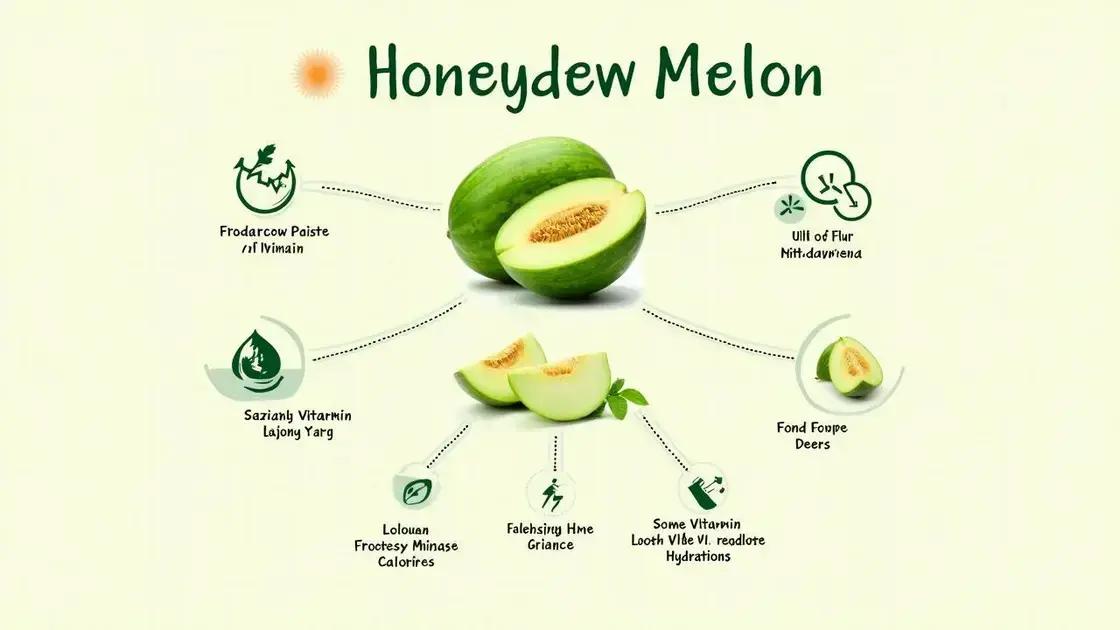The connection between honeydew melon and cardiovascular wellness is significant, as honeydew is low in calories, rich in vitamins, and packed with antioxidants that support heart health. Incorporating honeydew into a balanced diet can help regulate blood pressure, improve digestion, and enhance hydration, ultimately reducing the risk of cardiovascular diseases.
Discovering the connection between honeydew melon and cardiovascular wellness is crucial for anyone interested in improving heart health. This delicious fruit, full of essential nutrients, plays a significant role in promoting heart health. In this article, we will delve into the nutritional components of honeydew melon, examine its benefits for the cardiovascular system, and explore how you can easily incorporate it into your daily diet.
Understanding Honeydew Melon

Understanding honeydew melon involves appreciating its unique characteristics and health benefits. This sweet, succulent fruit belongs to the melon family, known for its smooth, pale green skin and juicy, sweet flesh. Honeydew melons are prized not only for their delightful taste but also for their various health benefits.
Appearance and Varieties
Honeydew melons have a distinctive appearance. They are typically round to oval in shape and come in various sizes, weighing anywhere from 3 to 8 pounds. The skin is a light yellow to pale green color, while the interior flesh is usually light green. Despite variations in size and color, the taste remains consistently sweet and refreshing.
Growth and Harvesting
This fruit grows in warm climates, thriving in sunny conditions. Honeydew melons require rich, well-drained soil to flourish. The key to their sweetness is the right amount of water during growth. Farmers usually harvest them when they reach full maturity, which allows the sugars to develop, enhancing their flavor.
Culinary Uses
Honeydew melons are incredibly versatile in the kitchen. You can enjoy them fresh, in fruit salads, smoothies, or even as a refreshing snack. Additionally, they can complement savory dishes with prosciutto or be included in salsas. Creative chefs often use honeydew in desserts, combining it with other fruits or serving it as a sorbet base.
Health Benefits
Beyond their delicious flavor, honeydew melons offer numerous health benefits. They are hydrating, containing over 90% water, which makes them perfect for summer. Honeydew is low in calories and high in vitamins, particularly vitamin C and potassium, which are known to support heart health.
Nutritional Profile of Honeydew

Nutritional profile of honeydew melon reveals why it is a great choice for a healthy diet. This fruit is not only delicious but also packed with essential nutrients that support overall health.
Caloric Content
Honeydew melon is low in calories, making it an ideal snack for those watching their weight. One cup of honeydew melon (about 177 grams) contains approximately 64 calories.
Vitamins and Minerals
This tasty melon is rich in vitamins and minerals. It is an excellent source of vitamin C, which helps boost the immune system and promotes skin health. Just one cup provides about 31% of the recommended daily value. Honeydew also contains potassium, which is vital for heart health and regulating blood pressure.
Hydration
With its high water content (over 90%), honeydew melon is great for staying hydrated. Proper hydration is critical for maintaining cardiovascular function and overall well-being.
Fiber
While honeydew is not high in fiber, it still provides about 1.4 grams per cup. Fiber is important for digestive health and can help lower cholesterol levels, which is beneficial for your heart.
Antioxidants
Honeydew melon is also a good source of antioxidants, which help protect the body from oxidative stress. These compounds can support heart health by reducing inflammation and lowering the risk of cardiovascular diseases.
Impact on Cardiovascular Health

Impact on cardiovascular health is an important aspect of the benefits of honeydew melon. This fruit can support heart wellness in various ways.
Antioxidant Properties
Honeydew melon is rich in antioxidants, which help fight free radicals in the body. Antioxidants can reduce oxidative stress, a major factor in heart disease. By incorporating honeydew into your diet, you may help protect your heart from damage.
Heart-Healthy Nutrients
This melon is a great source of vitamins and minerals that contribute to heart health. The high vitamin C content helps maintain healthy blood vessels and supports overall cardiovascular function. Potassium, abundant in honeydew, aids in regulating blood pressure, which is vital for a healthy heart.
Hydration and Circulation
The hydration provided by honeydew, thanks to its high water content, plays a critical role in maintaining healthy circulation. Good hydration supports blood volume and helps heart efficiency. In turn, this can promote better overall cardiovascular health.
Low Calorie and Fiber Content
Being low in calories makes honeydew a guilt-free addition to your diet. Furthermore, while it contains limited fiber, it still contributes to digestive health. Healthy digestion is linked to improved heart health since it can help control cholesterol levels and support metabolic functions.
Weight Management
Eating low-calorie fruits like honeydew can aid in weight management. Maintaining a healthy weight is essential for heart health, as obesity is a significant risk factor for cardiovascular diseases. Adding honeydew to your meals can satisfy cravings while helping you manage your weight.
Studies Linking Honeydew and Heart Wellness

Recent studies linking honeydew and heart wellness highlight the significant role that this delicious fruit can play in maintaining cardiovascular health. Various research findings show how honeydew can be beneficial to the heart.
Antioxidant Research
Many studies focus on antioxidants found in honeydew melon. Antioxidants help combat oxidative stress, which is a risk factor for heart disease. Research indicates that consuming fruits rich in antioxidants, including honeydew, may reduce the likelihood of developing cardiovascular issues.
Cardiovascular Disease Prevention
Some studies suggest that a diet high in fruits like honeydew is associated with a lower risk of cardiovascular disease. The nutrients found in honeydew, such as vitamins and potassium, support healthy blood pressure and blood vessel function, contributing to overall heart wellness.
Effects on Blood Pressure
Research shows that potassium-rich foods, like honeydew, can help regulate blood pressure levels. A study published in a health journal noted that individuals who consume sufficient potassium have lower blood pressure, which can decrease the risk of heart attacks and strokes.
Heart Health Benefits of Hydration
Studies also emphasize the importance of hydration for heart health. Honeydew’s high water content not only helps keep you hydrated but also supports overall heart function. Good hydration has been linked to better blood circulation and reduced strain on the heart.
Impact on Cholesterol Levels
Several research efforts indicate that diets rich in fruits like honeydew can help lower bad cholesterol levels (LDL) and improve overall cholesterol balance. Maintaining a healthy cholesterol level is crucial for preventing heart disease.
Incorporating Honeydew into Your Diet

Incorporating honeydew into your diet can be easy and delicious. This sweet melon is not only tasty but also packs a nutritional punch that supports your health.
As a Snack
One of the simplest ways to enjoy honeydew is to cut it into cubes and eat it as a snack. You can carry these cubes to work or school for a fresh, hydrating treat.
Fruit Salads
Honeydew is an excellent addition to fruit salads. Combine it with other colorful fruits like berries, kiwi, and pineapples for a vibrant and nutritious dish. The sweetness of honeydew complements the tartness of other fruits well.
Smoothies
Add honeydew to your smoothies for a refreshing boost. Combine it with yogurt, spinach, and a banana for a potent heart-healthy drink. This not only enhances the flavor but provides essential nutrients.
Salads
Consider adding honeydew to green salads. It pairs well with spinach, arugula, and nuts. The sweetness of honeydew balances savory ingredients, creating a tasty dish.
Desserts
Honeydew can also be used in desserts. You can blend it in sorbets, or serve it with a drizzle of honey or yogurt. Its natural sweetness makes it a delightful, low-calorie dessert.
Flavor Pairings
Honeydew goes well with various flavors. Try pairing it with mint, lime, or even prosciutto for a unique savory dish. These combinations can enhance the flavor profile of your meals.
Embracing Honeydew for Heart Health
The connection between honeydew melon and cardiovascular wellness is clear. This delicious fruit offers essential nutrients that support heart health, from its antioxidant properties to its rich vitamin profile.
By incorporating honeydew into your daily diet, you can enjoy its numerous benefits while satisfying your taste buds. Whether as a refreshing snack, in salads, or blended into smoothies, honeydew can easily fit into a heart-healthy lifestyle.
As studies reveal the positive impact of honeydew on cardiovascular health, it stands out as a tasty way to promote overall well-being. Don’t miss out on the opportunity to enhance your heart health with this nutritious and flavorful melon.
FAQ – Frequently Asked Questions about Honeydew Melon and Heart Health
What are the health benefits of honeydew melon?
Honeydew melon is low in calories and high in vitamins C and potassium, which promote heart health and regulate blood pressure.
How can I include honeydew in my diet?
You can enjoy honeydew as a snack, add it to fruit salads, blend it in smoothies, or use it in desserts.
Does honeydew help with heart disease prevention?
Yes, studies suggest that the antioxidants and nutrients in honeydew may reduce the risk of cardiovascular diseases.
Is honeydew melon good for hydration?
Absolutely! Honeydew has a high water content, making it an excellent choice for staying hydrated.
Can honeydew support weight management?
Yes, its low-calorie nature makes honeydew a great option for those looking to manage their weight while enjoying a sweet treat.
Are there any specific recipes that highlight honeydew?
You can try honeydew in a refreshing fruit salad, blend it into smoothies, or combine it with prosciutto for a savory dish.













